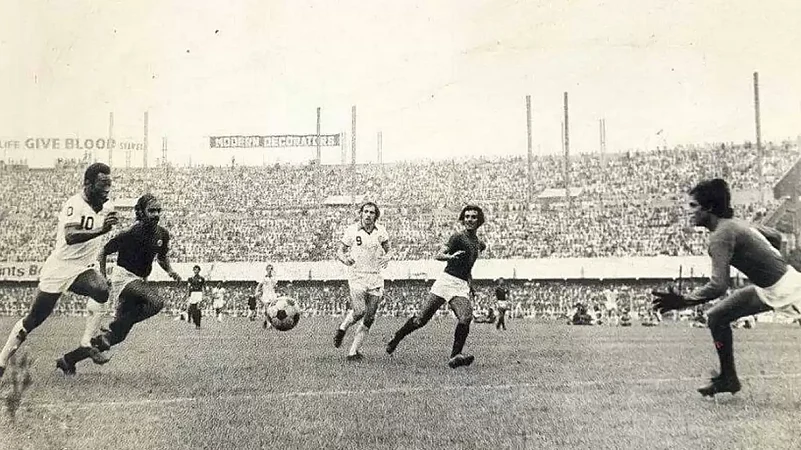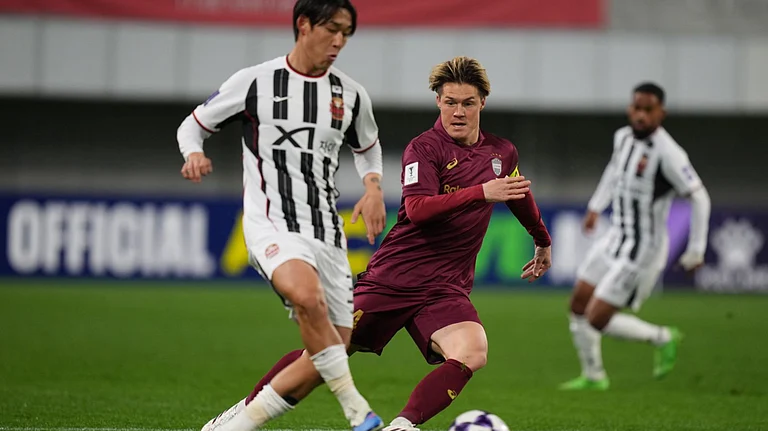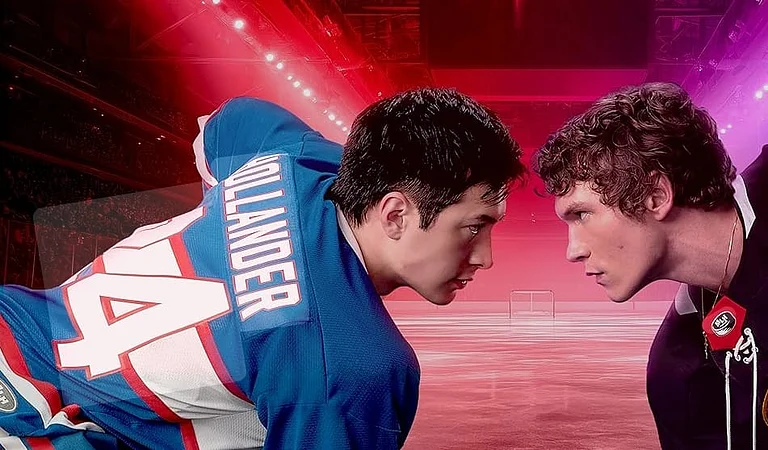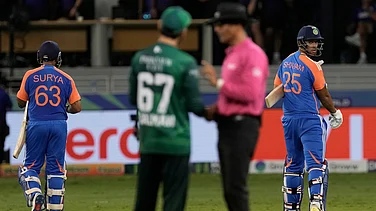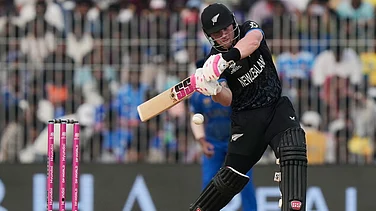Vast swathes of West Bengal went into mourning last month when Luka Modric’s Croatia knocked Brazil out of the World Cup. But there are other parts, equally big, which are still celebrating Lionel Messi & Co.’s triumph. However, both sets of fans were anxious about the health of the world’s most famous Brazilian – Pele – who passed away in Sao Paolo on December 29. Perhaps, excluding their own continent, Pele and Diego Maradona, friends and foes now together up above, have their most passionate following in West Bengal. The two sets of fans often pit their nostalgia against each other, but Pele fans have one big advantage – the king of football played a match in Kolkata, the maverick Argentine could only wave to the gallery and show off some moves he was born with. He was 48 and long retired when he landed in Kolkata.
“Credit [for Pele’s first visit in September 1977] goes to Dhirenda (legendary Mohun Bagan official Dhiren De),” says former India footballer Subrata Bhattacharya, who led Mohun Bagan in that famous exhibition match against Cosmos Club at Eden Gardens. “Dhirenda took the initiative to make Cosmos, and thereby Pele, play in our city. I can’t forget the excitement when he first informed us that we were going to play against Pele. That team had some other World Cuppers, too, like Carlos Alberto. But we were so overwhelmed by Pele that we stopped warming up before that match just to watch him warm up.”
Bhattacharya’s enthusiasm was shared by Pradeep Chowdhury, who was one of the two footballers trusted with marking Pele that day by Coach PK Banerjee.
“Whenever I remember I’ve played a match against Pele, I feel I’ve lived my dream,” Chowdhury says. “Pradipda (PK Banerjee) had planned zonal marking for the great man. Gautam (Sarkar) was supposed to mark him in his own half and I had that responsibility in our half. To know we mostly succeeded (the match ended 2-2) makes me happy even after so many years.”
In fact, Mohun Bagan were leading 2-1 with goals from Shyam Thapa and Akbar for a long time before Cosmos equalised via a controversial penalty. But that is for the record. The emotions Pele generated that day - 24 September, to be specific - at Eden are still felt in the voice of Amit Kumar Basu. The 75-year-old die-hard Mohun Bagan and Brazil supporter watched Pele from the stands that day.
“I was fortunate that my uncle was a member of Mohun Bagan and I got the chance to watch the king of football from so close in my late twenties,” he says. Basu clearly remembers the atmosphere at the ground. “Unlike one of those matches against East Bengal or Mohammedan Sporting, the crowd was vociferous for the home team yet friendly towards the opponents. Because everyone was there to watch Pele. Each one of us realised it was the chance of a lifetime, even though Pele was in his twilight years.”
It is important to remember that television was still a novelty in this part of the world and Kolkata Doordarshan started its journey only a year before the Cosmos match. What prompted the fascination for Pele then? Basu credits the recordings of 1958, 1962 and 1970 World Cup matches. “Sometimes they (Doordarshan) used to telecast some matches long after they were played. Instead of whetting our appetite they used to make us hungrier but thank heavens, we came to know of the greatness of Pele and that Brazil side.” That is how, he explains, hordes of Bengalis became Brazil fans. Hence the urge to see Pele in the flesh.
Different accounts of that match suggest there were close to 75,000 spectators at Eden Gardens that day but in fact, almost all of West Bengal had its eyes and ears glued to Pele.
“Live sport was a rare thing on TV in those days,” recalls Debasish Bose, a retired engineer. “But we came to know from newspaper ads that the Pele match would be shown live. We were eager to watch it.”
As luck would have it, Bose had to go to a party meeting far from his home in Shibpur, on the other side of Ganga. “Some of us had gone to Hedua (north Kolkata) for a political programme but somehow we got into a community hall where the match could be watched. I had just started my engineering course at Shibur BE College. There were around 30 people, mostly young, in front of the TV. We thoroughly enjoyed the action. Pele’s lob to Carlos Alberto for the first goal is still fresh in my memory.”
Bose, however, feels the Brazilian could hardly show what he was famous for. Pradeep Chowdhury partially blames the underfoot conditions for that.
“There’s no denying Pele was not the same force in 1977,” he says. “But one has to admit the ground was not very playable either. There had been heavy rain a day or two before the match and the state of the ground didn’t impress Pele’s insurance agents. But the man was so magnanimous that he said he couldn’t disappoint so many people who had turned up to watch him.”
Subrata Bhattacharya described how Pele appreciated Mohun Bagan’s performance and that motivated them.
“Dhirenda took me to their hotel after the match as I was the captain. Pele hugged me and congratulated us for our show on the field. Truly, from goalkeeper Shivaji Banerjee (who is no more) to Habib, Akbar, late Subhas Bhowmik, Pradeep, Sudhir Karmakar, Dilip Palit – everyone was excellent in that match. Till then the season was not going well for Mohun Bagan. We had lost to arch-rivals East Bengal a few days back and fans were very upset. The performance against Cosmos charged us up and we defeated East Bengal in the IFA Shield final four days later.”
Bhattacharya has a picture of himself with Pele at the toss framed on his drawing room wall. Obviously it is an unforgettable moment of his life. But Pele has penetrated much deeper into Bengali collective memory. In Satyajit Ray’s last film Agantuk (1991), Ranjan Rakshit (played by the inimitable Rabi Ghosh) comes to meet globetrotter Manomohon Mitra (Utpal Dutt) and asks him about the places he has been to. The moment Manomohan says his last stay was in Brazil, Ranjan gets palpably excited. The globetrotter does not understand the reason, so the husband of his niece explains “O bodhoy Peler kotha bhabche” (He’s perhaps thinking about Pele). Ranjan is agitated that somebody coming from Brazil does not know who Pele is. Manohoman, on the move since early youth, can recall with some effort that Pele is some footballer. He admits he does not know much about football: “Mohun Bagan, East Bengal. The limit of my knowledge.”
It seems Bengal’s most famous filmmaker thought you can take a Bengali out of Pele, but not Pele out of a Bengali.






